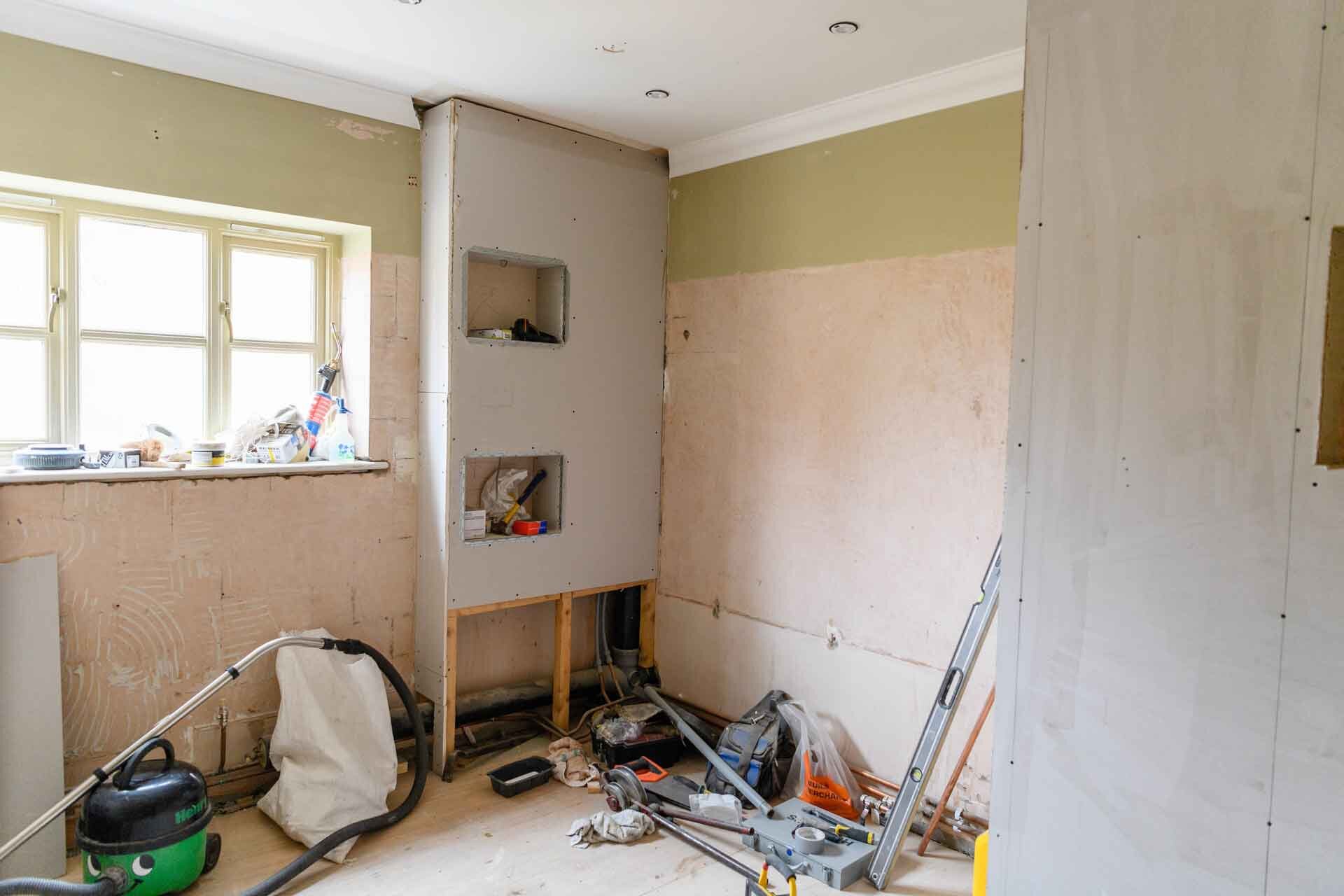Homeowners in Pinellas County, Florida often face significant challenges when selling a house with unpermitted work. These unauthorized renovations, additions, or modifications are improvements made without securing the necessary permits from local building authorities.
From basement conversions to bathroom additions or kitchen remodels, unpermitted work can create serious complications when it’s time to sell. This detailed guide covers everything you need to know about managing unpermitted work during the selling process, including permit acquisition after completion, consequences of unpermitted residential work, permit requirements, how to verify existing permits, legalizing unpermitted improvements, understanding the permitting process, and the potential costs involved.
How to Get a Permit After Work Has Been Done

Assess the Situation
When pursuing a permit for already completed work, start by thoroughly evaluating the extent of the unpermitted improvements. Identify all modifications, enhancements, or renovations that were done without proper authorization. Hiring a qualified home inspector or licensed contractor for a comprehensive assessment can help pinpoint unpermitted work accurately. Consider engaging a licensed contractor or architect to evaluate the unpermitted improvements and provide recommendations for bringing everything up to code. These professionals can help gather necessary documentation and guide you efficiently through the permitting process.

Contact the Local Building Department
Get in touch with your local building department to discuss your specific situation. They can provide guidance on the steps needed to obtain retroactive permits. This typically involves submitting detailed plans of the completed work and arranging for necessary inspections.

Organize Documentation
Prepare comprehensive plans and specifications that accurately reflect the unpermitted project. These documents should precisely represent the finished work and include any updates required to meet current building standards. Gather all essential paperwork related to the unauthorized improvements, including detailed diagrams, blueprints, and specifications. If possible, locate original project plans or permits for other parts of the property to provide helpful context for building officials.

Submit Permit Applications
Submit your completed permit applications to the local building department. Be sure to include all required documentation, such as detailed plans, specifications, and descriptions of the work. Be prepared to pay application fees during this stage of the process.

Schedule Inspections
After submitting your permit applications, the building department will arrange inspections to verify that the completed work meets current building codes. Depending on the scope and complexity of the work, you may need to undergo multiple inspections.

Make Necessary Corrections
If inspections reveal code violations or deficiencies, you’ll need to make the required corrections to bring the structure up to code. This often involves hiring licensed contractors to ensure the work meets all requirements. After completing the corrections, you’ll need to schedule follow-up inspections.

Obtain Final Approval
Once all inspections are passed and necessary corrections are complete, the building department will issue final approval or a certificate of occupancy. This document officially confirms that the work complies with local building codes and regulations.
Get an offer today, sell in a matter of days.
We buy houses in ANY CONDITION! We always pay CASH! With us you will never pay any Real Estate commissions or fees. You are under no obligation whatsoever. Just submit your address and email below and answer a few easy questions on the next page. You will receive a cash offer in 24 hours. Thanks ahead of time!
Consequences of Unpermitted Residential Work
Legal and Financial Risks
Unpermitted work exposes homeowners to significant legal and financial risks. If discovered by local authorities, you could face substantial fines, penalties, and orders to remove or correct the unpermitted improvements. This process can be both costly and time-consuming.
Reduced Property Value
Unpermitted work can significantly decrease your property’s market value. Potential buyers are often deterred by unpermitted improvements, fearing future legal complications and unexpected expenses. This can make selling your home at a fair market price particularly challenging.
Difficulty Obtaining Financing
Most lenders require that all work on a property be properly permitted and compliant with building codes. Unpermitted improvements can make it extremely difficult for potential buyers to secure financing, further complicating your sale process.
Complications During Home Inspections
Unpermitted work frequently raises red flags during the home inspection process. These issues can lead to delays, difficult renegotiations, or even complete cancellation of the sale if buyers are unwilling to take on the associated risks.
Liability Issues
Homeowners can be held legally responsible for injuries or damages resulting from unpermitted work. This includes structural failures, electrical fires, or plumbing problems causing water damage. These liability issues can result in expensive legal disputes and settlements.
Increased Insurance Premiums
Insurance companies may charge significantly higher premiums or even deny coverage for properties with unpermitted work. This occurs because unpermitted improvements are considered higher risk due to potential code violations and safety hazards.
When a Permit is Required for Home Repairs
Common Home Repairs Requiring Permits
- Structural Changes: Any modifications to a home’s structural elements, such as adding or removing walls, require permits.
- Electrical Work: Installing new electrical wiring, outlets, or circuits requires proper electrical permits.
- Plumbing Work: Modifying or installing new plumbing systems, including water heaters and sewer lines, requires plumbing permits.
- HVAC Systems: Installing or replacing heating, ventilation, and air conditioning systems requires mechanical permits.
- Additions: Building new rooms, extensions, or other additions requires proper building permits.
- Roofing: Major roofing repairs or complete replacements typically require permits.
- Windows and Doors: Installing new windows or doors that change the structure or size of openings requires permits.
- Decks and Patios: Building or modifying decks, patios, or other exterior structures requires proper permits.
Minor Repairs Typically Not Requiring Permits
- Painting and Wallpapering: Cosmetic updates like painting and wallpapering generally don’t require permits.
- Flooring: Installing new carpet, tile, or hardwood flooring typically doesn’t require permits.
- Minor Plumbing Repairs: Simple plumbing repairs like fixing leaks or replacing faucets usually don’t require permits.
- Landscaping: Standard landscaping and gardening activities typically don’t require permits.
How to Check House Permits

Contact the Local Building Department
The most direct way to verify if permits have been issued for work on your property is to contact your local building department. They maintain official records of all permits issued for properties in their jurisdiction.

Use Online Permit Databases
Many local governments now offer online databases where you can search for permits by property address. These systems provide information about issued permits, including work type, current status, and inspection results.

Review Property Records
Examine property records, including title reports and previous sale documents, to identify any mentions of permitted work. These records can provide valuable insights into past renovations and improvements.

Hire a Professional Inspector
A professional home inspector can identify unpermitted work and verify whether necessary permits were obtained. These experts are trained to recognize signs of unauthorized modifications and can provide detailed assessment reports.
The Permitting Process

Determine Permit Requirements
Reach out to your local building department to determine the specific permit requirements for your project. Requirements vary significantly based on the type and scope of the work being performed.

Prepare Permit Applications
Carefully prepare your permit applications, including comprehensive plans and detailed specifications for the proposed work. Ensure all necessary documentation is included to avoid processing delays.

Submit Applications and Pay Fees
Submit your completed applications to the building department and pay all required fees. Keep copies of all submitted documents for your personal records and future reference.

Schedule Inspections
After permits are issued, schedule required inspections at various project stages to ensure compliance with building codes. Inspections may be needed before, during, and after the work is completed to verify proper implementation.

Make Necessary Corrections
If inspections identify any deficiencies, make the required corrections to bring the work up to code. Schedule follow-up inspections as needed to verify the issues have been properly addressed.

Obtain Final Approval
After successfully passing all inspections and completing any required corrections, obtain final approval from the building department. This ensures your work is fully compliant with local building codes and regulations.
Associated Costs
Permit Application Fees
Permit application fees vary significantly depending on the type and scope of work. Typical fees range from $50 for minor improvements to $2,000 or more for major renovations.
Inspection Fees
While inspection fees are often included in the initial permit application costs, additional fees may apply for follow-up inspections. These typically range from $100 to $500 per inspection. This is why getting the work done correctly the first time is financially important.
Correction Costs
The expenses for correcting code violations or deficiencies vary widely based on the nature of the work. Hiring qualified licensed contractors to make necessary repairs can range from a few hundred dollars for minor issues to several thousand for major corrections.
Penalties and Fines
If local authorities discover unpermitted work, you may face substantial penalties and fines. These can range from a few hundred dollars to several thousand, depending on the severity and extent of the code violations.
Professional Fees
Hiring professionals such as contractors, architects, or inspectors to assist with the permitting process adds to your overall costs. These professional fees vary significantly based on your project’s scope and the specific experts involved.
How Pinellas Cash Buyers Can Help
At Pinellas Cash Buyers, we understand that addressing unpermitted work can be overwhelming, stressful, and financially draining. As experienced real estate investors, we specialize in purchasing properties as-is, meaning you don’t have to worry about obtaining permits or making costly repairs. Here’s how we can help you:
- Quick and Fair Offers: We provide fast, competitive cash offers that allow you to sell your property without unnecessary delays.
- No Permitting Hassles: We purchase homes in any condition, eliminating your need to navigate the complex permitting process or make expensive corrections.
- Streamlined Process: Our straightforward buying approach ensures a smooth, stress-free transaction from start to finish.
By choosing Pinellas Cash Buyers, you can completely avoid the complications and expenses associated with unpermitted work, making it significantly easier to sell your house quickly and efficiently.
Selling a house with unpermitted work involves navigating a complex, time-consuming, and often expensive process. From obtaining retroactive permits to addressing potential consequences, understanding the steps and costs involved is crucial. However, if you prefer a hassle-free solution, Pinellas Cash Buyers offers a convenient alternative by purchasing your property as-is. Contact us today at (727) 263-2886 to learn how we can help you sell your house without the stress and financial burden of dealing with unpermitted work.
We buy houses in ANY CONDITION! We always pay CASH! With us you will never pay any Real Estate commissions or fees. You are under no obligation whatsoever. Just submit your address and email below and answer a few easy questions on the next page. You will receive a cash offer in 24 hours. Thanks ahead of time!

